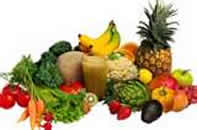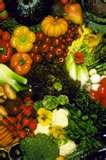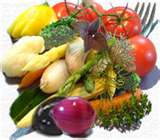| Share |  |
 | |||
Digestion: It All Starts Here
 The digestive system is essential to the functioning of all body systems. Food is the fuel our bodies need to recreate healthy cells efficiently and digestion is what makes nutrition work. If digestive and absorptive processes don't function properly, the best of foods cannot nourish the body. It has often been said "you are what you eat," but it would be more accurate to say, "you are what you digest." Digestion breaks down nutrients in food into the smallest molecules so they can be absorbed into the blood to nourish each cell and provide optimal health and energy for the body.
The digestive system is essential to the functioning of all body systems. Food is the fuel our bodies need to recreate healthy cells efficiently and digestion is what makes nutrition work. If digestive and absorptive processes don't function properly, the best of foods cannot nourish the body. It has often been said "you are what you eat," but it would be more accurate to say, "you are what you digest." Digestion breaks down nutrients in food into the smallest molecules so they can be absorbed into the blood to nourish each cell and provide optimal health and energy for the body.
Poor Digestion is the Cause of 85% of Degenerative Diseases
Is it any wonder that more than 85% of degenerative diseases and an array of ailments, stem from some type of gastrointestinal tract dysfunction? As many as 100 million Americans suffer with some type of digestive distress. These symptoms often foreshadow chronic degenerative diseases that now appear in increasing numbers, and at earlier stages of life, than ever before. The deadly process may begin and even continue for years with minor symptoms such as headaches, low energy, lowered resistance to infections, gas, bloating, constipation, heartburn and indigestion, but it can eventually lead to more serious conditions such as allergies, cancer, autoimmune diseases, irritable bowel, Chrohns disease, ulcerative colitis, gallstones, pancreatitis, fibromyalgia, chronic fatigue, and skin diseases like psoriasis and eczema.
Understanding the Process
The Mouth
Understanding some basics of the digestive process is beneficial to grasp what can hinder or help the process. Digestion begins in the mouth where large food particles are broken into smaller particles by mastication (i.e. chewing), signaling the release of salivary amylase, a starch-digesting enzyme. The salvia produced also contains an enzyme called "lysozyme" which helps kill potential food-borne bacteria. The better food is chewed, the more surface area is exposed for the salivary enzymes to work, resulting in a lighter load for the other digestive organs. Salivary enzymes can digest as much as 30 to 40 percent of starches before food even reaches the stomach. Some experts advocate chewing as much as 30 times! But what matters most is that food is converted to a somewhat liquid state to the point of involuntary swallowing before traveling through the pharynx and esophagus into the stomach.
 The Stomach
The Stomach
The next phase of digestion takes place in the stomach, a holding and mixing tank where food is churned and liquefied. The entrance of food in the stomach's upper portion signals the body's formation of hydrochloric acid (HCL) that provides the acidic environment for the activation of pepsinogen. Pepsinogen converts to pepsin, which splits protein into small peptide fragments that are later converted to amino acids in the small intestine. Another function of HCL is to prevent infection by destroying most parasites and bacteria in ingested food. It takes about 45 minutes for this acid to form and begin its digestive work though it can take much longer in those over the age of 40. Many senior adults are no longer able to produce sufficient stomach acid to adequately initiate protein digestion, and may need supplementation. When proteins are not sufficiently broken down due to a lack of hydrochloric acid secretion, bloating, gas, heartburn and other gastric distresses often occur. Low HCL production can also result in problems with bacterial infections and parasites.
Antacids Are Not the Answer
Antacids Counteract Good Digestion
 In the case of heartburn or other forms of indigestion, the real problem is too little acid available in the stomach for adequate breakdown of protein, rather than too much acid. Last year alone, Americans spent nearly one billion dollars on over-the-counter antacids and more than 13 billion on prescription acid suppressants that just cover up symptoms temporarily, and do nothing to improve one's ability to digest food. Even more serious problems can occur when pepsin is neutralized and the stomach's digestion of food proteins cease as protein digestion only occurs in the stomach. If this happens, the body then falsely assumes, based on the change of pH levels, that proteins are sufficiently broken down and will prematurely release large particles of undigested protein into the small intestine. These undigested food particles can wind up in the bloodstream where they are regarded as foreignforeign invaders,' producing a jump in white blood cells that puts a strain on an already overworked immune system. Undigested food remnants become toxins in the bloodstream and soil for bacteria to feed upon, producing food sensitivities or allergies, intestinal toxicity, overgrowth of unfavorable bacteria, yeast overgrowth and impaired intestinal permeability, or leaky gut syndrome.
In the case of heartburn or other forms of indigestion, the real problem is too little acid available in the stomach for adequate breakdown of protein, rather than too much acid. Last year alone, Americans spent nearly one billion dollars on over-the-counter antacids and more than 13 billion on prescription acid suppressants that just cover up symptoms temporarily, and do nothing to improve one's ability to digest food. Even more serious problems can occur when pepsin is neutralized and the stomach's digestion of food proteins cease as protein digestion only occurs in the stomach. If this happens, the body then falsely assumes, based on the change of pH levels, that proteins are sufficiently broken down and will prematurely release large particles of undigested protein into the small intestine. These undigested food particles can wind up in the bloodstream where they are regarded as foreignforeign invaders,' producing a jump in white blood cells that puts a strain on an already overworked immune system. Undigested food remnants become toxins in the bloodstream and soil for bacteria to feed upon, producing food sensitivities or allergies, intestinal toxicity, overgrowth of unfavorable bacteria, yeast overgrowth and impaired intestinal permeability, or leaky gut syndrome.
Enzymes are Essential
Raw Foods Contain Natural Enzymes
Another factor contributing greatly to the problem of inadequately digested food reaching the bloodstream is lack of digestive enzymes. Raw food is far easier to digest since enzymes are contained within it, whereas cooked and processed foods require more energy. Enzymes in foods exposed to heat over 118 degrees are denatured and can no longer function as the biological catalysts in breaking down foods for proper absorption and utilization for which they were designed.  Since the majority of people's diets mostly consist of cooked and processed food, the pancreas is called upon to produce more and more extra enzymes beyond the "finishing enzymes" normally produced for the last phase of digestion in the small intestine. Eating too many enzyme deficient foods overworks and eventually exhausts digestive organs laying the groundwork for digestive dysfunction leading to chronic disease.
Since the majority of people's diets mostly consist of cooked and processed food, the pancreas is called upon to produce more and more extra enzymes beyond the "finishing enzymes" normally produced for the last phase of digestion in the small intestine. Eating too many enzyme deficient foods overworks and eventually exhausts digestive organs laying the groundwork for digestive dysfunction leading to chronic disease.
A Few Tips for Better Digestion
Take an Enzyme Supplement Before Meals
Taking a good quality plant-based digestive enzyme supplement with meals can supply enzymes missing in cooked or processed foods. It also can shore up the depleted enzyme reserves in the body that diminish even further with age. These supplemental enzymes have the ability to digest a broad spectrum of foods throughout the length of the digestive tract because they are active in a pH range as low as 2-3. This enables them to help predigest food in the acidic stomach as well as being active in the pH range of 4-9 of the small intestine, whereas pancreatic enzymes can only work in a pH above 7.5. Though some people may be careful to replace the vitamins and minerals lost in the processing of food, many do not realize how important it is for food enzymes to be replaced as well.
 Drink Before or Between Meals, Not During
Drink Before or Between Meals, Not During
An additional tip for promoting better digestion is to drink liquids before and between meals, instead of during meals, as excess liquid in the stomach, with the food, delays digestion in addition to diluting gastric juices and enzymatic activity needed for effective digestion. Drinking ice cold liquids with or soon after meals will also arrest digestion as the stomach must be brought back up to body temperature for digestion to resume.
Avoid Certain Combinations of Foods
It is also helpful to understand that different types of food have different transit times through the digestive system and different enzymes and secretions that act upon them. For instance fruit, eaten alone, remains in the stomach as little as 10 minutes up to an hour, starches may take two to three hours, proteins about four hours, etc. When different types of food are eaten in combination that require opposite conditions for their digestion, the secretions may clash with each other and limit effective digestion of either food. Due to the sugar content of fruits and certain carbohydrates, fermentation, resulting in digestive distress, may occur when they are eaten together with proteins and fats that take much longer to digest. Fruit should preferably be eaten on an empty stomach and never on top of a heavy meal with proteins. The cleansing benefit of fruit is lost when it is eaten in combination with other types of foods.

Drink Herbal Teas Such as Peppermint and Ginger
When eating meals that contain many different types of food together, as we particularly do during the holidays, it may be helpful to take some extra enzymes and to drink herbal teas such as peppermint and ginger, both known to be effective digestive remedies.
Better Digestion Means Better Health
As you better understand what goes on "behind the scenes" in your digestive tract and assist your body with these digestive tips, you will be on your way to better digestion and better health.
Copyright © 2008-2015 Lucinda Bedogne, CNHP, CNC
Post Your Comment...
|
|
||||||||||||


